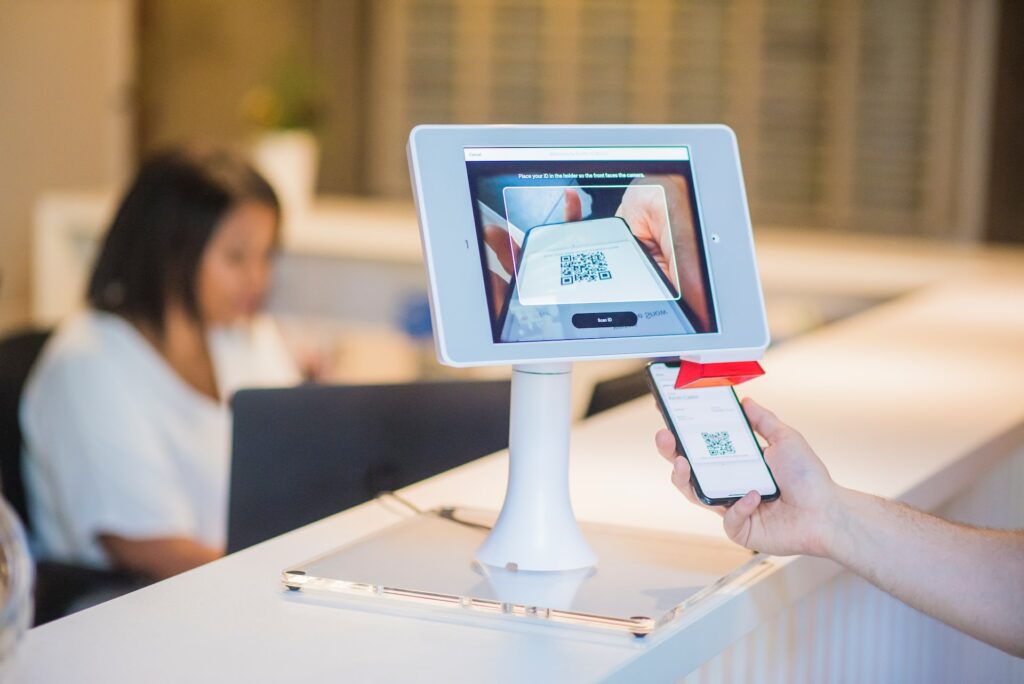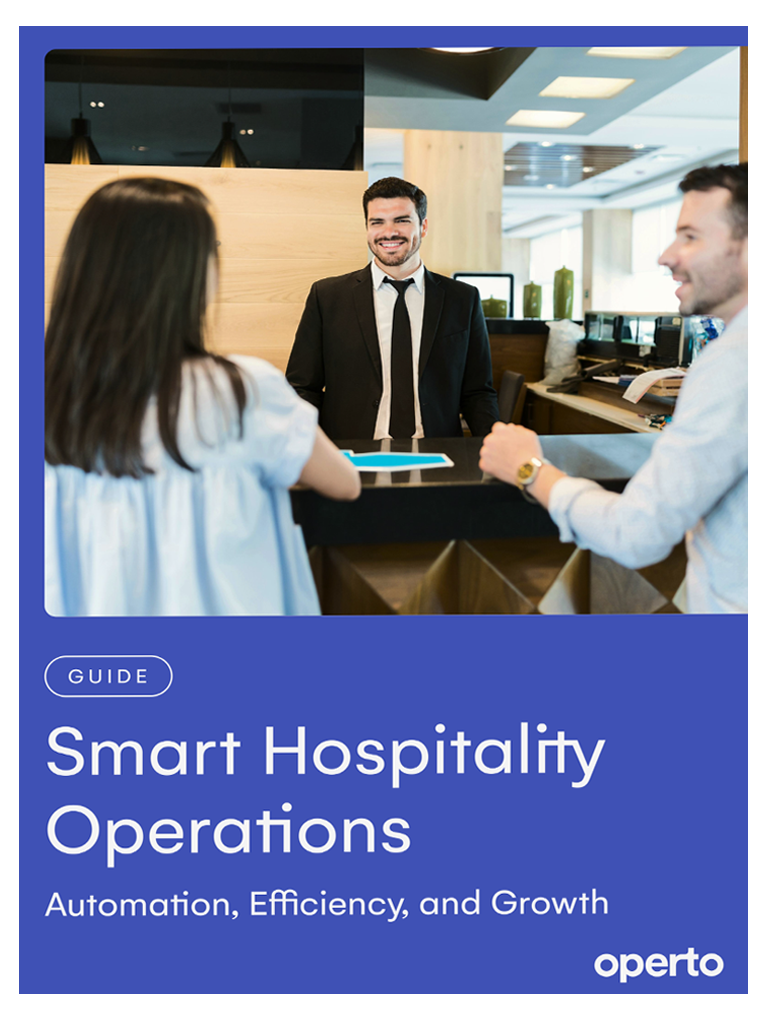Hotel Automation: 2025 Tips for Better Operations Performance

Hotel automation has become essential in modern hospitality. With ongoing labor shortages and changing guest expectations for seamless digital experiences, hotels must adopt automation. This transformation can significantly enhance operational efficiency while ensuring high-quality interactions with guests.
This guide outlines the key aspects of hotel automation, including the technologies involved, implementation strategies, and the measurable benefits for your establishment.
What is Hotel Automation?
Hotel automation is transforming the hospitality industry by using advanced technology to simplify repetitive tasks. This shift reduces workloads and minimizes human error, enhancing operational efficiency. Key components include mobile check-ins, AI-driven guest communication, and automated energy management.
Mobile check-ins enable guests to bypass front desk delays and access their rooms quickly, while AI communication tools provide personalized interactions and tailored recommendations. These systems adapt to guests’ preferences, improving the service experience.
Automated energy management optimizes resource usage by adjusting heating, cooling, and lighting based on occupancy, promoting sustainability and reducing costs.
By integrating these technologies, hotels can deliver a seamless experience that meets modern expectations for convenience and personalization. Automation also allows staff to focus on meaningful guest interactions, enhancing satisfaction and fostering brand loyalty. This transformation helps hotels maintain a competitive edge in a rapidly evolving industry.
Current 2025 Trends in Hotel Automation
AI-Powered Personalization
Hotels increasingly use artificial intelligence to analyze vast amounts of guest data, enabling them to offer highly personalized services tailored to individual preferences. This includes adjusting room settings such as lighting, temperature, and entertainment options to meet each guest’s specific needs. Additionally, AI-driven chatbots are being employed to provide instant support around the clock, significantly reducing wait times for guests and enhancing overall service quality. These chatbots can efficiently address common inquiries, assist with bookings, and offer local recommendations, allowing human staff to focus on more personalized interactions.
Smart Room Innovations
Integrating Internet of Things (IoT) technology is revolutionizing the guest experience by transforming standard hotel rooms into smart rooms. IoT-enabled devices allow guests to easily control various aspects of their environment, such as lighting, temperature, and window shades, through user-friendly mobile apps or voice commands. This level of customization enhances guest comfort and aids in energy conservation by enabling automated adjustments based on real-time occupancy data and preferences. For example, the lights can be programmed to dim when a guest watches a movie, and the heating can be automatically adjusted when the room is unoccupied.
Contactless Services
With the increasing demand for safe and hygienic travel experiences, many hotels are implementing a variety of contactless services that focus on guest convenience and health. For instance, mobile check-ins allow guests to skip front desk lines, while digital keys enable keyless entry to their rooms via smartphones. Automated payment systems simplify transactions, making it easy for guests to settle their bills. By reducing friction and minimizing physical interactions, these technologies enhance the overall experience, allowing guests to feel more in control and secure during their stay.
Robotic Assistance
The introduction of robotic staff in hotels is changing the dynamics of operational efficiency and guest interaction. Robots are now used to handle various tasks such as luggage delivery, room service, and cleaning, which optimizes workflow. This allows human employees to focus more on complex customer service interactions that require a personal touch. For instance, while a robot delivers a guest’s meal to their door, hotel staff can spend quality time assisting guests with unique requests or offering local insights. This combination of technology and personalized service enhances the overall guest experience while improving operational efficiency for hotel management.
Benefits of Hotel Automation
1. Enhanced Guest Experience
With automation, guests enjoy frictionless interactions, such as self-check-in, mobile keys, and AI-driven chatbots, for instant service and information access. This technology also enables personalized recommendations and real-time communication, elevating guest satisfaction and engagement.
2. Operational Efficiency
Automated task scheduling, real-time housekeeping updates, and energy management systems help hotels optimize staff workloads and reduce operational bottlenecks. Automation tools streamline inventory tracking, service requests, and maintenance scheduling, reducing inefficiencies and improving overall performance.
3. Cost Savings
Hotels can lower staffing expenses by automating repetitive tasks. For example, Prague Residences reduced front desk operations and saved $10,000 monthly after implementing automation. Additionally, automation minimizes human errors in check-ins, billing, and guest communications, further reducing costs.
4. Increased Data Insights
Automation tools collect and analyze data, allowing hotels to better understand guest preferences, streamline services, and make data-driven decisions. With actionable insights, hotels can adjust pricing strategies, predict demand fluctuations, and optimize resource allocation to maximize revenue.
Challenges of Hotel Automation
1. High Initial Investment
Implementing automation technology requires upfront investment in hardware and software, which may be a challenge for smaller hotels. However, long-term cost savings and increased operational efficiency often outweigh the initial expenditure.
2. Integration Complexity
Ensuring seamless integration between automation tools and existing property management systems (PMS) can be technically demanding. Hotels must carefully select solutions that offer easy compatibility with their current infrastructure to avoid disruptions in operations.
3. Staff Adaptation
Employees must be trained to use new technology, and some may resist automation due to fear of job displacement. A well-planned transition strategy, including proper training and communication, can help alleviate concerns and ensure successful adoption.
4. Cybersecurity Concerns
As hotels adopt more digital solutions, data security and privacy become critical issues that require robust cybersecurity measures. Hotels must implement strong encryption, multi-factor authentication, and compliance protocols to protect guest data from cyber threats.
The Bottom Line
Hotel automation transforms the hospitality industry by enhancing guest experiences, streamlining operations, and reducing costs. However, successful implementation requires careful planning, investment in the right technology, and proper staff training.
By utilizing Operto solutions, hotels can stay ahead of industry trends while providing their guests with a seamless and modern experience.
Adopting automation is essential for hotels aiming to thrive in an increasingly technology-driven environment. The right tools improve operational efficiency and create a more personalized and frictionless experience for guests, ultimately leading to higher revenue and stronger brand loyalty.
Are you ready to automate your hotel operations? Explore Operto solutions today!
Frequently asked questions
An area of hotel operations that’s commonly automated is guest access management. By generating mobile keys and logging each check-in and check-out, automation software makes guests more autonomous while tracking occupancy status, and reducing the workload at the front desk.
As hotels struggle with labor shortages, automation is essential to delivering a great guest experience. By handling what were traditionally manual tasks, like check-in, hotel technology reduces pressure on staff, helps minimize errors, and increases guest autonomy and independence.
Get Your Free Guide: Smart Hospitality Operations: Automation, Efficiency, and Growth.

Latest News
Stay informed and inspired: discover the freshest blog articles, latest updates, and breaking news.



